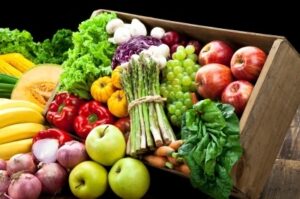Do you feel like you’re always fighting a losing battle when it comes to weight loss? You’re not alone. Many people find the process of dieting and exercise to be difficult and frustrating. But it doesn’t have to be that way! In this blog post, we will discuss how to reduce weight in a way that is simple, easy to follow, and most importantly – effective. So if you’re ready to start seeing results, keep reading!
Contents
How To Reduce Weight
Here are 8 tips for reducing weight that you can start incorporating into your routine today:
Eat more fruits and vegetables
Fruits and vegetables are packed with vitamins, minerals, and fiber – all of which help to keep you feeling full longer and burning calories more efficiently. Plus, they’re naturally low in calories so you don’t have to worry about eating too much. Aim for at least 5 servings per day, and try to include a variety of colors on your plate. Studies have shown that doing this can help you lose weight more quickly.
Here are some tips to include more fruits and veggies in your diet

- Choose a variety of colors: Try to include different colors in your meals, such as reds, greens, oranges, yellows, and purples. What’s more, try to eat the rainbow!
- Make it a part of your breakfast: Start your day off with a smoothie or bowl of oatmeal topped with sliced bananas, berries, and nuts. Furthermore, you can even add a few tablespoons of oats to your smoothie.
- Pack them as snacks: Pack snacks like apples, carrots, or celery sticks to take with you on the go. Additionally, you can make a batch of trail mix with nuts, dried fruit, and dark chocolate chips.
- Add them to salads: Create a nutrient-packed salad by adding a variety of vegetables and fruit.
- Include them in your meals: Add diced zucchini, bell peppers, and mushrooms to your tossed salad, pasta dishes, and casseroles.
- Try frozen or canned: When fresh produce isn’t available, frozen and canned fruits and vegetables are a great option. You can even find frozen smoothie packs which make it easy to whip up a healthy snack or breakfast in minutes.
- Experiment with different flavors: Experiment with different flavors and spices to make your meals more interesting. For example, try adding a little chili powder or cumin to stir-fries for a flavorful kick.
Increase your physical activity
Regular exercise is essential for weight loss, as it helps you burn calories and build muscle. Aim for 30 minutes of physical activity per day. You can even break this up into shorter 10-minute chunks throughout the day if that works better for your schedule. Studies have shown that even short bursts of physical activity can have major health benefits.
Here are some tips to help you get active

- Set realistic goals: Start by setting achievable goals for yourself. Make sure to set short-term and long-term goals, as this will help you stay focused and motivated.
- Incorporate movement: Look for ways to add more physical activity to your daily routine. Take the stairs instead of the elevator, take a walk during your lunch break, or do some stretching or yoga in the morning.
- Join a class: Join an exercise class, such as aerobics or kickboxing, to keep you motivated and help you reach your goals. Alternatively, try something new like biking or swimming.
- Break up your workouts: Take short breaks between sets of exercises so that you can catch your breath and recharge. This will help ensure that you can push yourself further during your workouts.
- Find a workout buddy: Having an exercise partner or group will help to keep you motivated and accountable.
- Change things up: Variety is the spice of life, and the same applies to exercise. Switch up your routine every few weeks to avoid boredom and prevent plateaus in your weight loss journey.
- Be consistent: Consistency is key when it comes to exercise. Make sure to stick with your routine and make time for physical activity every day, even if it’s just a few minutes.
- Listen to music: Music can be a great motivator during workouts. Create a playlist of upbeat songs that will help you stay focused and energized.
- Reward yourself: It’s important to reward yourself for reaching your goals. Set small rewards for each goal you reach, such as a massage or new workout clothes.
Above all, remember that exercise should be enjoyable! Find activities that you enjoy and look forward to doing every day.
Balance your calorie intake
Balancing your calorie intake is an important part of any weight loss journey. Your body needs a certain number of calories to function properly and losing weight requires you to take in fewer calories than you burn. Studies have shown that the most successful way to lose weight is to create a calorie deficit of 500-1000 calories per day.
Here are some tips for balancing your calorie intake

- Keep a food diary: Tracking your calorie intake can help you stay on track and make sure you’re not overeating. Moreover, it allows you to see patterns in your eating habits that you may not have noticed before.
- Plan your meals: Planning and prepping your meals in advance will help you stay within your calorie goals.
- Eat slowly: Eating slowly helps to ensure that you don’t overeat. Take the time to savor each bite and recognize when you’ve had enough.
- Choose nutrient-dense foods: Choose foods that are high in nutrition and low in calories, such as fruits and vegetables.
- Limit processed foods: Processed foods are typically high in calories and low in nutrition. Try to limit your intake of processed foods as much as possible.
- Drink plenty of water: Water helps to keep you full and hydrated. It also helps your body absorb the nutrients from the food you eat.
- Be mindful of portion sizes: Pay attention to the amount of food you’re eating. Don’t overeat, even if it’s healthy food.
- Eat breakfast: Eating breakfast is an important part of any weight loss plan. It helps to kick-start your metabolism and boost your energy levels for the day.
- Avoid crash diets: Crash diets are often ineffective and can even be dangerous. Opt for a healthy, balanced diet instead.
- Get enough sleep: Getting enough restful sleep is essential for maintaining a healthy weight, as it helps to regulate hormones and metabolism.
- Seek professional help: If you’re having trouble balancing your calorie intake, consider seeking guidance from a nutritionist or dietitian. They can help you create a meal plan that’s tailored to your individual needs.
Get enough sleep
Getting enough restful sleep is an important part of any weight loss plan. Studies have shown that inadequate sleep can lead to weight gain, as it disrupts hormones and metabolism.
Here are some tips for getting enough restful sleep

- Establish a bedtime routine: Create a pre-bedtime routine that helps you relax and prepare for sleep. This could include taking a warm shower or reading a book.
- Limit caffeine intake: Caffeine can interfere with sleep, so try to limit your intake of caffeinated beverages and foods after noon.
- Avoid electronics before bed: The blue light from electronic devices can disrupt sleep patterns, so avoid using them for at least an hour before bedtime.
- Exercise regularly: Exercise can help improve your quality of sleep. Aim for at least 30 minutes of aerobic exercise per day.
- Create a comfortable sleeping environment: Make sure your room is dark, quiet, and cool. This will help you to fall asleep more easily.
- Go to bed at the same time each night: Try to maintain consistency with your sleep schedule. Going to bed and waking up at around the same time will help your body establish a healthy circadian rhythm.
- Avoid late-night snacks: Eating close to bedtime can disrupt sleep, so avoid snacking at least two hours before you go to bed.
- Limit alcohol consumption: While it may make you feel sleepy in the short term, drinking alcohol can affect your quality of sleep and make it harder for you to get restful sleep.
- Limit daytime naps: If you’re having difficulty sleeping at night, avoid taking long naps during the day as this can interfere with your nighttime sleep.
- Talk to your doctor: If you’re still having trouble getting enough restful sleep, talk to your doctor about any underlying medical issues that could be affecting your sleep. They may be able to recommend treatments or lifestyle changes that can help improve your quality of sleep.
Drink water
Drinking water is essential for staying healthy and hydrated, as it helps to regulate body temperature, flush out toxins, and transport nutrients and oxygen to cells. Studies have shown that staying hydrated can also help to improve mood, focus, and cognitive function.
Here are some tips for staying hydrated

- Carry a water bottle with you: Keep a reusable water bottle with you throughout the day, so you can easily access it when thirsty.
- Drink before meals: Drinking some water before meals can help to reduce your overall calorie intake, as it may make you feel fuller.
- Drink throughout the day: Make sure to sip on water regularly throughout the day to stay hydrated.
- Choose water over sugary drinks: Try to limit your intake of sugary drinks, such as sodas and juices, as they can be high in calories and may increase your risk of tooth decay.
- Flavor your water: If you don’t like the taste of plain water, add some fresh fruit or herbs to give it a natural flavor.
- Eat foods with high water content: Eating fruits and vegetables that are high in water content, such as cucumbers and melons, can help keep you hydrated.
- Drink after exercise: Make sure to drink plenty of water after exercise, as it can help replace any fluids lost through sweat.
- Drink before bed: Drinking a glass of water before bed can help prevent dehydration during the night.
- Check your urine color: If your urine is a pale-yellow or clear color, you’re likely drinking enough water. If it is dark yellow, you may need to increase your intake.
- Know your body’s needs: Everyone’s water needs are different, so make sure to pay attention to what works for you and adjust as needed.
- Set reminders: Set an alarm or reminder on your phone to prompt you to drink water throughout the day.
Eat more protein
Protein is an essential nutrient that helps to build and maintain muscle, as well as regulate hormones and enzymes. Studies have shown that eating a higher protein diet can help improve weight loss, reduce appetite, and increase energy levels.
Here are some tips for incorporating more protein into your diet

- Choose lean sources of protein: Lean sources of protein, such as chicken, fish, and egg whites are great options for adding protein to your diet.
- Opt for plant-based proteins: Plant-based proteins, like nuts, seeds, and legumes are a great way to get in extra nutrients while getting your daily dose of protein.
- Add protein to every meal: Aim to include a source of protein at each meal, such as eggs or tofu, to help keep you feeling full throughout the day.
- Mix it up: Don’t be afraid to try out different sources of protein, like tempeh or quinoa, for some variety in your meals.
- Incorporate protein-rich snacks: Incorporate snacks high in protein, such as yogurt and nuts, between meals to help keep your energy levels up.
- Go for Greek yogurt: Greek yogurt is an excellent source of protein, as it contains twice the amount of regular yogurt.
- Eat more fish: Fish is a great source of lean protein, as well as omega-3 fatty acids, which can help reduce inflammation.
- Limit processed meats: While some processed meats, like bacon and sausage, can be high in protein, they are also high in saturated fat and sodium. Try to limit your intake of these foods.
- Add chia seeds to smoothies: Chia seeds are an excellent source of plant-based protein, and can easily be added to smoothies or sprinkled on top of salads.
- Choose organic dairy: If you’re consuming dairy products, opt for organic sources, as they contain fewer hormones and chemicals than conventional brands.
Avoid processed foods
Processed foods are those that have been altered from their original state, usually to increase shelf life or add flavor. While many processed foods can seem convenient and tasty, they often contain additives such as added sugars, unhealthy fats, and preservatives. Studies have linked the consumption of processed foods to an increased risk of obesity, diabetes, and heart disease.
Here are some tips to help reduce your consumption of processed foods

- Plan ahead: Take the time to plan out meals for the week in advance and create a shopping list based on these plans. This will help you avoid buying processed food impulsively.
- Read labels carefully: Take the time to read labels carefully. If a food contains too many additives, it is likely processed.
- Go for whole foods: Choose whole foods such as fruits and vegetables as much as possible over-processed options.
- Shop the perimeter: Stick to shopping around the perimeter of the grocery store where you’ll find mostly fresh, unprocessed foods.
- Avoid packaged snacks: Packaged snacks such as chips, cookies, and crackers are usually high in fat, sugar, and sodium and should be avoided if possible.
- Choose fresh over canned: Opt for fresh ingredients whenever possible instead of canned or frozen options.
- Opt for plain yogurt: Plain yogurt is a much healthier option than flavored yogurts which often contain added sugars.
- Look for minimally-processed items: Look for minimally-processed items such as whole grains, nuts, and nut butters to add to your meals.
- Opt for homemade versions of popular dishes: Instead of buying pre-made meals like macaroni & cheese or lasagna that likely contain preservatives, opt for making your own version at home with fresh ingredients.
- Cook in bulk: Cook meals in bulk and freeze leftovers to have quick, healthy meals on hand when you’re in a rush.
- Limit processed meats: Processed meats such as bacon, sausage, and deli meat are often high in sodium and saturated fat and should be limited.
Conclusion
Processed foods can be easy and convenient, but they often contain unhealthy additives that could increase the risk of certain diseases. To reduce your intake of processed foods, focus on shopping for whole foods, reading labels carefully, and opting for homemade versions of popular dishes. Following these tips can help you achieve a healthier diet overall.
Consider contacting FitMantra for additional information on nutrition and fitness. You can also get in touch with their nutrition experts through our online nutrition counseling, who can guide you through the process and help you achieve your fitness goals. You can also lose weight with the help of our weight loss program. Download our Fitness app on Android to learn more about us.
